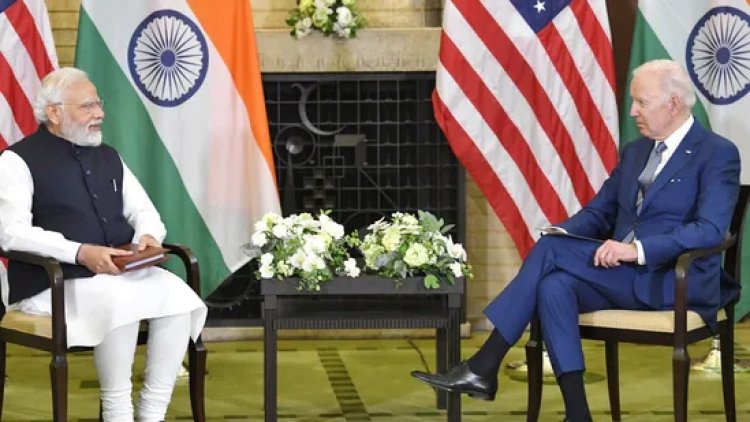India - US: Modi, Biden Bilateral
STORIES, ANALYSES, EXPERT VIEWS

Prime Minister Narendra Modi and U.S. President Joe Biden met along the sidelines of the Tokyo Quad leaders’ summit for a bilateral meeting, their second in a little over a month, with the two leaders having met virtually on April 11 before the India-U.S. 2+2 Defence and Foreign Ministries dialogue.
Relationship ‘among the closest' in the world - Biden: Biden, expressing an idea he has articulated for years, said he would work for the U.S.-India relationship to be “among the closest” in the world. “Mr. Prime Minister, there’s so much that our countries can and will do together, and I am committed to making the U.S.-India partnership among the closest we have on Earth.”
Biden also brought up the concept of “democracies delivering”. The President and his administration have described the world, repeatedly, as currently witnessing a battle between democracies and autocracies.
‘Partnership of trust’ - Modi: At the bilateral, Modi called the India-U.S. partnership a “partnership of trust”. Our shared values, and our common interests in many areas, including security, he said “have strengthened the bonds of this trust.”
‘Common perspective’ on the Indo-Pacific region: Modi said that India and the U.S. “share the same perspective” on the Indo-Pacific region, a contrast to the positions on the Ukraine-Russia front. The U.S. readout said the “leaders noted with pleasure the establishment of the Indo-Pacific partnership for maritime domain awareness”.
PM Modi however, added that bilateral trade and investment were expanding but “much below” their potential
Thrust on investment and technological cooperation: Significantly therefore, the two countries signed an agreement that would allow the U.S. International Development Finance Corporation (DFC) to expand investment support in India for SMEs, healthcare, renewable energy and infrastructure, among other areas.
India and the U.S. also launched an Initiative on Crucial Emerging Technologies (iCET), an initiative led by the two National Security Councils to cooperate on critical and emerging technologies. The Indian readout listed examples such as quantum computing, artificial intelligence (AI), 5G/6G, biotech, semiconductors, and space.
The U.S., in its readout, said that it would join six of India’s Technology Innovation Hubs to support at least 25 joint research project this year in areas including, AI, data, health, climate and agriculture.
Indo Pacific Economic Framework (IPEF): India signing up to the Biden administration’s economic cooperation framework for the region – the Indo Pacific Economic Framework (IPEF), launched Monday — was noted positively by both sides. The Indian readout emphasised the flexible nature of the framework and its taking into account the “respective national circumstances”.
Differences over Ukraine: In the U.S. readout of the meeting, Biden condemned Russia’s “unjustifiable war” and the two leaders “discussed how to cooperate to manage disruptions caused by the war in Ukraine, in particular the rise in energy and food prices, to protect their respective citizens and the world”.
The Indian readout was silent on the Russia-Ukraine war. Since Russia invaded Ukraine on February 24, the two countries have sought to manage their noticeable differences on the conflict — specifically India’s purchase of energy at a discount from Russia and its refusal to condemn Russia’s aggression, including at the United Nations.
Key takeaways
The Ministry of External Affairs (MEA) said the meeting “resulted in substantive outcomes” which will “add depth and momentum” to the bilateral partnership. The key outcomes:
Critical tech: The India-US Initiative on Critical and Emerging Technologies (iCET) is to be co-led by India’s National Security Council Secretariat and the US National Security Council. The MEA said this will forge closer linkages between the government, academia and industry of the two countries in areas such as artificial intelligence, quantum computing, 5G and 6G, biotech, space and semiconductors.
Health: Extension of longstanding Vaccine Action Programme (VAP) until 2027 to continue joint biomedical research which had resulted in the development of vaccines and related technologies. Expanding collaboration to fight non-communicable diseases including diabetes and cancer.
AI/Data science: The White House readout said the US plans to join six of India’s Technology Innovation Hubs to support at least 25 joint research projects in 2022 in AI, and data science to advance progress in applications such as agriculture, health and climate.
Defence/New defence: The White House announced India joining the Combined Military Forces-Bahrain as an associate member. The MEA said Modi invited US industries to partner with India to manufacture in the defence sector. Agreement on expanding cooperation in new defence domains, including space, cyber, and launching a dialogue on AI this year.
Investments: Both concluded an Investment Incentive Agreement which provides a framework for US Development Finance Corporation to continue to expand its investment in India for private sector-led projects in renewable energy, agriculture, health, and SME financing
Climate action: Enhancing partnership to accelerate India’s energy transition, including through the US-India Climate and Clean Energy Agenda 2030 Partnership, especially in renewables deployment, decarbonising energy and industrial sectors, zero-emissions vehicles.
















